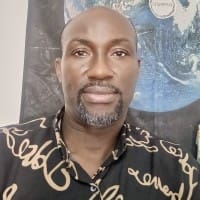The Community Leader Mobilizing Dialogue for Peace. Member Spotlight: James Offuh
During the Nigerian Civil War in 1967, a young couple fled the country through underground tunnels. They ended up in Côte d’Ivoire, where shortly thereafter, a future peace advocate was born: Mr. James Offuh. As a child, his parents took him to Nigeria to rediscover his roots in the Igbo community. Mr. Offuh grew up with a keen awareness of the adverse effects of violent conflict, and has dedicated his life to “bridging divides to heal broken relationships and gaps of mistrust.”
 Mr. Offuh first became a barber in Abidjan to support his wife and young children. He had aspired to attend higher education to study peacebuilding, but lacked the financial resources at the time. This highlights a gap in education that Mr. Offuh identifies: schools should teach children effective communication and encourage civic engagement from an early age. That way, peacebuilding can be integrated into the curriculum in order to equip the younger generation with essential inter-personal skills.
Mr. Offuh first became a barber in Abidjan to support his wife and young children. He had aspired to attend higher education to study peacebuilding, but lacked the financial resources at the time. This highlights a gap in education that Mr. Offuh identifies: schools should teach children effective communication and encourage civic engagement from an early age. That way, peacebuilding can be integrated into the curriculum in order to equip the younger generation with essential inter-personal skills.
Instead, Mr. Offuh took advantage of online courses to get certified in a myriad of skills: Nonviolence and Conflict Reconciliation, Integrated Data Analytics for Sustaining Peace, Conflict Transformation, Social Dialogue Communication, Community Healing, and Skills for Effective Negotiation, among others. Then, following a disputed presidential election in 2010, Côte d’Ivoire underwent a widespread political and civil crisis. There was rampant crime and violence in the streets, frequently perpetuated by teenagers. Mr. Offuh shared that “seeing young people used as a tool for war broke [his] heart.”
His barbershop became a safe space for people to go during this period of conflict. It was not only a reprise from the chaos, but also a place for productive dialogue and the building ground for Mr. Offuh’s NGO. After getting their hair cut, many customers did not leave the shop, instead sticking around to participate in the deep conversations taking place. Mr. Offuh wondered out loud, “Why do people choose violence? Why not start with negotiation instead?” He mused about the power of public engagement and the oneness of humanity which seemed to be too-often forgotten.
During this time, Mr. Offuh also found a way to include children in peacebuilding. He made his barbershop into a “Children’s Peace Library.” This way, kids had a welcoming place to come away from the danger of the streets.

Word got around in Mr. Offuh’s community about the barber who spoke like a preacher and a philosopher, who had big ideas about peace and the passion to implement them. Mr. Offuh began meeting with people outside of the barbershop to continue the important conversations being had. This eventually turned into his NGO, called United for Peace Against Conflicts International.
One of the NGO’s crown achievements is its success in negotiating peace between two rival tribes in Côte d’Ivoire. The United Nations had designated a village to be a “red zone.” The Gueree and Dozos tribes were engaged in a fierce land dispute, and neither the government nor the UN had succeeded in ensuring any peace. Mr. Offuh thought to himself, “Wow, what an opportunity!” He knew that if his NGO didn’t go to the village, no one else would.
Despite warnings that the intervention would be a suicide mission, Mr. Offuh and his team ventured into the village and engaged both tribal leaders in productive dialogue. To Mr. Offuh, witnessing enemies heal themselves through rational communication is “magic”—“that’s a miracle,” he said.
Mr. Offuh is quick to recognize the importance of proper training in peacebuilding. It is crucial to be hyper-sensitive to each party’s social and emotional balance. Mr. Offuh emphasizes the importance of understanding each individual’s unique triggers for their “Freeze, fight, or flight” response. Without being tuned into this phenomenon, a mediator can make a conflict worse or even get harmed himself.
Today, Mr. Offuh marvels at the fact that his career in peacebuilding began from a humble barbershop chair. Now, he is a program advisor for the Euphrates Institute and designs elective peacebuilding courses for universities.
Mr. Offuh has also been the recipient of many impressive awards. He was recognized as a Goldin Global Fellow in 2022 and the Euphrates Institute’s Visionary Peace-Builder Honoree in 2018. He also received the 2024 Award for Humanity Flourishing Prize by the I Am Humanity organization and the 2023 Award for Accelerating Black Leadership and Entrepreneurship Mentors Community by the African Diaspora Network.
Mr. Offuh views these recognitions as a “pillar of significance” for young people to look up to. It is an honor for him to be an inspiration for the youth. Through his work, Mr. Offuh hopes to “uncover a new social intelligence and unleash unprecedented creativity” into the world.
Mr. Offuh’s story reveals an incredible perseverance, bravery, and natural leadership ability which has taken him to great heights in the field of peacebuilding. His NGO (and barbershop) continues to be a source of empathy and strength in Côte d’Ivoire. Indeed, in his words, “Tough times don’t last, but tough people do.”
Article by Elsie Aleck, MBBI Writer
